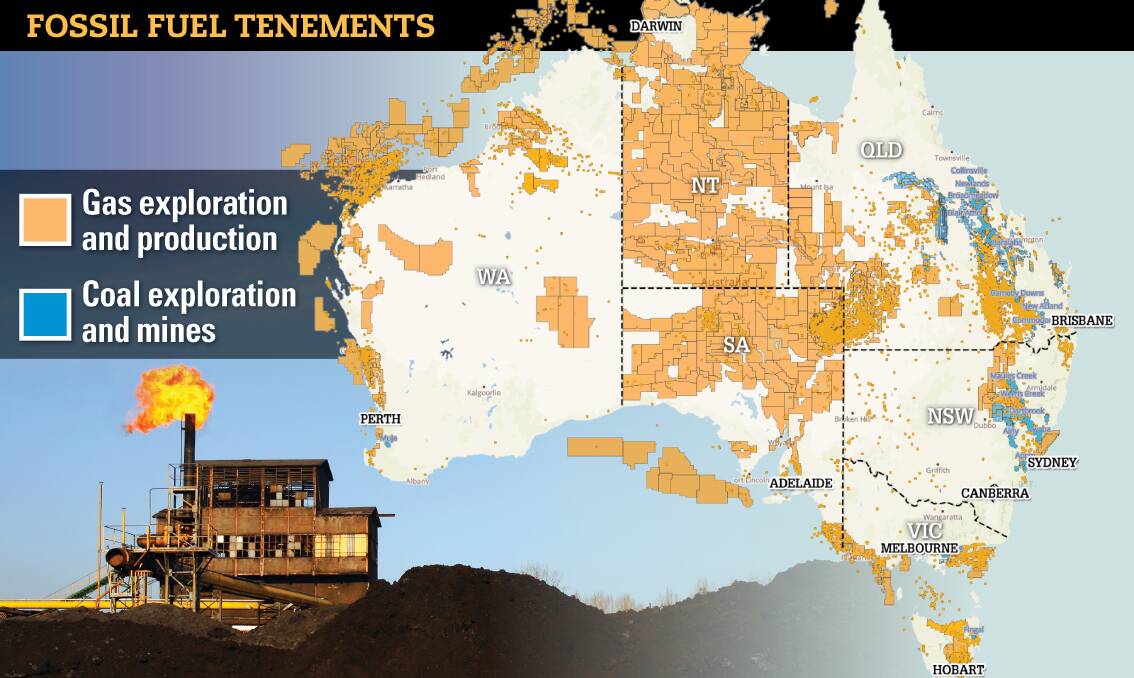
A rush is on to get new resources projects rolling.
Subscribe now for unlimited access.
or signup to continue reading
The threat of disruption from a new Labor government appears to be motivating the movement, as the Coalition trails in the lead up to a federal poll due by May 18 next year.
Landholder rights, environmental impacts and economic returns are increasingly controversial and the Coalition and Labor’s internal divisions are on show.
Labor's national conference in Adelaide on December 16 will showcase debate between MPs and unions who support the industry and its jobs and those who oppose fracking due to the impact on water resources and the contribution of gas to carbon emissions.
This week, New England Nationals MP Barnaby Joyce highlighted a tricky issue for the Coalition when he tabled a regional mining report from a committee he chaired.
The Keep it in the Regions report identified regional benefits from mining, but recommended significant new measures to ensure private profits from resources were equitably shared among impacted landholders and communities. (See Fact Box below)
“The question that is always posed is: where has this wealth gone? It is not much use to the people of Emerald and it's not much use to the people of Rockhampton if the wealth from their area ends up in Melbourne, Sydney or, in some instances, London,” Mr Joyce said.

“The report also talks about coal seam gas and how we can make sure that people on the land are partners in that industry, rather than just being exploited by that industry, to make sure that the beneficiaries of the wealth that resides in that area is seen in the towns and in the commercial hubs of that area.”
It also suggested a raft of new measures to improve the payment terms between miners to small contractors, reduce fly-in-fly-out workforces, increase local procurement and invest in local economic diversification.
The government is yet to indicate its position on the report and, as it stands, no projects are subject to the proposed changes.
Keep it in Regions report recommendations
- Profitability of wells should be shared with landholders
- Landholders get at least a least 2pc of revenue
- Arbitration process for disputes with developers
- Similar measures should cover other extractive industries
- COAG to develop national framework for resource licences
- Minimum standards for social licence to operate, including an impact assessment
Some Coalition MPs in marginal regional seats, including Resources and Northern Australia Minister Matt Canavan, promote projects like the Adani coal mine in Queensland and fracking in the Northern Territory and Western Australia.
Fracking moratoriums have been lifted by the Northern Territory and Western Australian governments, opening up vast areas for NT shale gas and oil exploration and WA tight and shale gas. Adani said it will progress its controversial mine while the neighbouring China Stone project has passed an environmental assessment.
Mr Canavan said communities like Townsville, Mackay, Rockhampton and Gladstone have prospered because of the mining sector, and he welcomed fracking in WA.
Nationals WA Member for North West Central Vince Catania said “open slather” fracking risked water resources.
A delegation of NT cattle station owners and Indigenous owners came to Canberra last week to warn politicians of the shale industry’s risk to groundwater resources.
Meanwhile, Liberal MPs voted against their party in South Australia’s parliament to create new laws banning mining along the state’s fertile Limestone Coast and the re-election of Labor in Victoria reaffirmed that state’s blanket ban on fracking.
Several controversial projects are stuck in limbo in NSW. Chinese miner Shenhua successfully pressured the state government to re-approve its exploration licence, but is yet to submit a water study required under federal law.
Santos’ Narrabri gas project is still on the go slow, after a decade of development, and the company was recently granted a 1000 day exploration extension.


